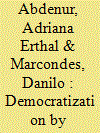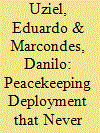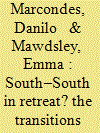|
|
|
Sort Order |
|
|
|
Items / Page
|
|
|
|
|
|
|
| Srl | Item |
| 1 |
ID:
153907


|
|
|
|
|
| Summary/Abstract |
The field of international development has undergone major shifts as South–South cooperation expands. New questions are being raised about the political implications of this cooperation, including with respect to democracy and human rights. In this paper, we analyse the role of Brazil, a democratic provider of South–South cooperation, in fomenting these principles in Africa. We find that explicit democracy promotion makes up a minority of Brazil’s cooperation with Africa. However, Brazil also engages in social policy initiatives which, despite not being labelled as democracy and human rights promotion, are inspired by Brazil’s own experiences with re-democratization—what we refer to as “democratization by association”. We argue that these initiatives—mostly geared towards institution-building in areas where Brazil seeks to promote itself as a hotbed of policy innovation—are disembedded from the political context in which they arose in Brazil. While this disembeddedness allows the Brazilian state to maintain its official discourse of non-interference, it also makes the political impact of Brazilian cooperation in Africa highly uncertain.
|
|
|
|
|
|
|
|
|
|
|
|
|
|
|
|
| 2 |
ID:
189213


|
|
|
| 3 |
ID:
181420


|
|
|
|
|
| Summary/Abstract |
The article aims at investigating how do mechanisms of bureaucratic politics contribute to the decision of deploying troops and in so doing to mold the national motivations underscoring the deployment. The text takes Brazil as a case and researches the decision-making process in the country, using past cases of deployments that actually happened. The bulk of the analysis, however, is dedicated to the negative case where Brazil decided not to contribute to the United Nations Multidimensional Integrated Stabilization Mission in the Central African Republic (MINUSCA). The analysis provides a breakdown of the 2017–2018 domestic political and bureaucratic decision-making process in Brazil as regards the possibility of deploying troops to MINUSCA and traces the mechanisms in action that resulted in the negative decision by the government. Based on the case of Brazil, considerations are made on the importance of investigating negative scenarios to better understanding how developing countries, such as the BRICS, value the motivations and ultimately decide to contribute to a UN mission.
|
|
|
|
|
|
|
|
|
|
|
|
|
|
|
|
| 4 |
ID:
154785


|
|
|
|
|
| Summary/Abstract |
This article explores the relationships between (so-called) ‘non-traditional’ development cooperation (NTDC) and political leadership. Using the case studies of Brazil and South Korea, we propose that certain emblematic elements of NTDC discourse and practice can act to influence the relationship with political leaders in particular ways. These are (a) elevated language of affect, (b) interleaving of personal biographies with the developmental trajectories of states, (c) the use of NTDC to legitimise domestic policies and promote domestic political leadership, (d) the prominence of presidential diplomacy and (e) the challenges confronting rapidly expanding domestic development cooperation institutions and systems.
|
|
|
|
|
|
|
|
|
|
|
|
|
|
|
|
| 5 |
ID:
153863


|
|
|
|
|
| Summary/Abstract |
Over the past decade or so, Brazil has become an increasingly active and visible global development partner, especially in Lusophone Africa and in Latin America, as part of a foreign policy strategy aimed at diversifying relations and expanding the country's presence in the global South. However, the period of high profile growth of South–South cooperation (SSC) under President Luiz Inácio Lula da Silva (2003–2010) was followed by a period of contraction under President Dilma Rousseff (2011–16). Rousseff's lower interest in foreign policy and Brazil's domestic economic and political difficulties have been the two main reasons advanced to explain this shift. We concur, but in this article we seek to nuance this argument. First, we suggest that the ‘retreat’ from SSC was not as deep as sometimes assumed. Second, we identify legacies from the Lula era which left Brazilian development cooperation vulnerable to downturns. These are: (a) the difficulties in updating legislation and institutions to accommodate the expanded role of Brazilian development cooperation; (b) the difficulties in cultivating political and public constituencies; and (c) enduring inter-Ministerial fragmentation. In the penultimate section, we comment on the early indications of where the post-impeachment Temer Presidency will lead SSC.
|
|
|
|
|
|
|
|
|
|
|
|
|
|
|
|
|
|
|
|
|